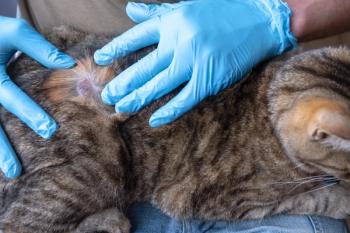
Ultimate authority
Boston - It's a surprise when Alan Van Tassel comes to visit. He drops by unannounced during business hours, makes a quick introduction and starts poring over a seven-point inspection checklist.
BOSTON — It's a surprise when Alan Van Tassel comes to visit. He drops by unannounced during business hours, makes a quick introduction and starts poring over a seven-point inspection checklist.
Consumer protection is the mission of every inspection, says Alan Van Tassel, who heads a team of investigators with the authority to spot-check veterinary facilities licensed by the state. Every practice in Massachusetts will be visited within the next 12 months, Van Tassel predicts. By far, most veterinarians pass inspection, he says. Those who fail face fines as well as more severe discipline.
Unless a practitioner receives a call from a wary veterinarian neighbor, there's no warning that Van Tassel or one of his five-member team will appear.
"Announced inspections have zero value," he says. As an investigations supervisor with the Massachusetts Office of Consumer Affairs and Business Regulation, he predicts every practice in the state will receive a visit within the next 12 months. Most owners comply. But Van Tassel, armed with a right to impose fines, promises to take disciplinary action against veterinarians when staff members reject state inspections by next year.
"We never have doctors refuse, but they are responsible for the professional behavior of staff, and the state can reprimand them," he warns. "We go in, we have badges, but we tend not to flash them. We're pretty unobtrusive. We can be in and out in 15 minutes."
Such power is uncommon among regulatory inspectors. Critics condemn what they characterize as Gestapo-like tactics for trapping veterinarians. But the system, Van Tassel says, is designed to keep the public protected and practices in check. In 2005, the Massachusetts Legislature made an unprecedented move when it passed an enforcement statute that allows spot inspections of the state's 43 trades and professions. The law grants investigators authority to impose on-the-spot fines for regulatory violations — a move that's led to an influx of disciplinary actions. Authorities report 20 veterinarians were disciplined since July, compared to 30 reported during the last fiscal year.
"This offers us a method short of severe discipline to achieve immediate results," Van Tassel says. "It's made the ability to go out and do inspections much more productive. We've been charging up to $100 per violation."
Out in the field
A second violation costs $500. The maximum fine for a repeat offense is $2,500. Those nabbed have 21 days to decide whether to appeal to the Massachusetts Board of Veterinary Medicine or pay the ticket. They also receive publicity on the Division of Professional Licensure's Web page, where a record of the infraction is published for 10 years.
Every violation is photographed for proof. "There is no John Wayne-ing here," Van Tassel says. "We bring digital cameras into these places. It's why we rarely see an appeal."
While no owner has repeated infractions such as failing to secure controlled substances or improperly disposing of syringes, egregious offenses are almost as rare. Occasionally there's an unlocked freezer full of carcasses out back or child care set up in a surgical area. Yet more than 90 percent of the Commonwealth's practices receive a clean bill of health. Those that fail most often get nailed on outdated drugs. Others are caught employing practitioners without valid licenses — a violation that carries a $1,000 fine and allows the Massachusetts Board of Veterinary Medicine to pursue criminal action.
"The situation's not uncommon considering Massachusetts borders five states, and none of them are terribly far away," the inspector says. "Usually, these people have graduated, passed the national exam and never submitted an application to the state board. They're generally guilt-ridden, trying to swallow this secret. It's often a stupid lie that gets out of hand."
Mapping practices
More are likely to be caught, considering the department's inspection agenda. While the Massachusetts Board of Veterinary Medicine holds roughly 2,600 licenses, no one knows how many practices are in the state. That's about to change, Van Tassel says.
Using Web sites like
"Drug diversion rears its ugly head from time-to-time," says Van Tassel, who works closely with the Drug Enforcement Agency's New England Divsion. "Improperly storing drugs is also a problem. It's our No. 2 violation."
"We haven't even touched the North Shore (north of Boston) yet, and it's a highly populated area," he says. "If you consider the fact that every single practice will have a publicly listed phone number, finding them is easy."
Still, old-fashioned word-of-mouth is what keeps many practitioners prepared.
Seven-point checklist
"If we're in a city, practitioners in neighboring communities will know we've been around and call each other," Van Tassel says. "That's OK. It keeps them alert. We get compliance without going into a place just by the fact that they believe we will appear."
Newsletter
From exam room tips to practice management insights, get trusted veterinary news delivered straight to your inbox—subscribe to dvm360.




